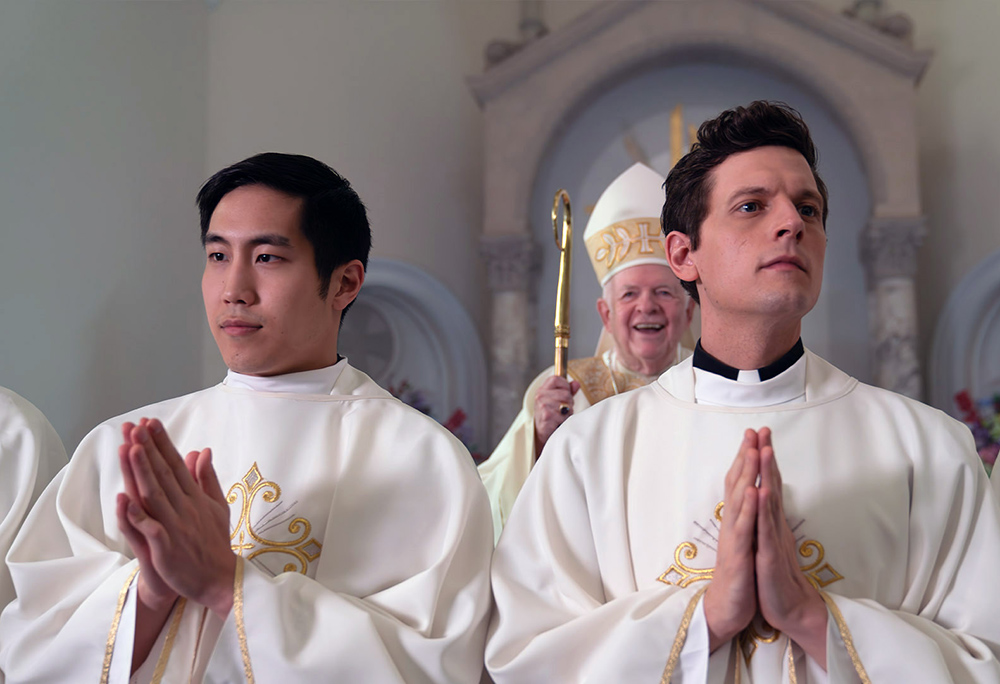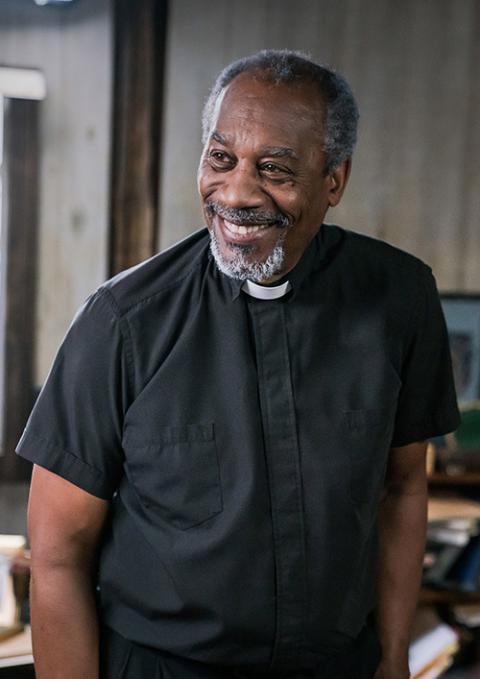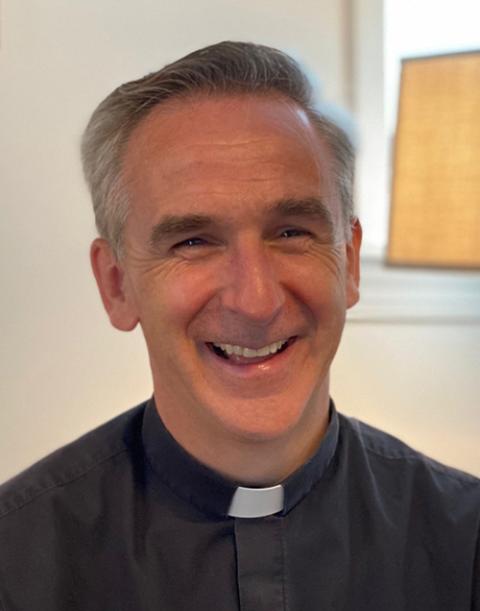
Actors Young Mazino, left, and Joshua Wills, right, portray Catholic seminarians in "Trinity's Triumph." (RNS/Courtesy image)
On a spring day in the mid-aughts, Fr. Stephen Fichter was grabbing a slice of pizza from a shop in Ho-Ho-Kus, New Jersey, when a boy from Fichter's church pointed to him and said, "I didn't know he could eat pizza!"
Almost two decades later, Fichter, pastor of St. Elizabeth of Hungary Church in Wyckoff, New Jersey, wants people to know that not only do priests enjoy gastronomic delights, they're also fully human.
"There's a sense of priests being a separate entity," said Fichter, who told Religion News Service that viewing priests purely as spiritual figureheads can, as the Catholic abuse crisis indicates, have dire consequences. And while reductive narratives in film and media depict priests as perfect heroes or evil villains, he said, truth is more complicated.
"I wanted to write a film that would strike a balance," said Fichter, who began developing the idea for the movie "Trinity's Triumph" in 1998.
Starring Emmy winner Joe Morton ("Scandal") and Emmy-nominated actor Young Mazino ("Beef"), "Trinity's Triumph" is now available to stream on Amazon Prime and other platforms. The first feature-length film written by a priest, according to Fichter, it follows three Catholic seminarians who tell corny jokes, sin occasionally and grapple with the demands of the priesthood.
"How many people really want to have vows of celibacy, poverty and obedience?" Thomas Plante, a professor of psychology at Santa Clara University, emeritus professor at Stanford University and co-editor of Sexual Abuse in the Catholic Church: A Decade of Crisis, 2002-2012, said about the challenges faced by today's Catholic seminarians. "Our culture so much values sexual freedom, doing whatever you want, whenever you want, and we worship money and riches. It's so completely countercultural to go into this kind of life."
According to Colleen McDannell, a religious studies professor at the University of Utah and editor of the book Catholics in the Movies, the holier-than-thou priests in early films such as "Going My Way" and "The Bells of St. Mary's" are the product of Hollywood's Motion Picture Production Code, a set of industry guidelines authored by Catholics in the 1930s that functioned as a form of self-censorship to avoid government interference.
"Up until the 1960s, you couldn't say anything negative about religion. You could not make the priest a hypocrite. And so in all the early films, any religious person, the minister or priest, they were good people," said McDannell.
The abandonment of the code in 1968 paved the way for more corrupt priestly characters, she added, like those in the 1981 thriller "True Confessions."
As Fichter set about writing a more nuanced screenplay, he sought input from Italian filmmaker Franco Zeffirelli (known for the miniseries "Jesus of Nazareth" and the 1968 movie version of "Romeo and Juliet") and suspense novelist Mary Higgins Clark, who was also one of Fichter's parishioners. By 2019, his team included co-writer and co-producer Kathe Carson and filmmaker Michael Wickham.
"I liked that it didn't shy away from some of the harder topics, when it comes to what it takes to be a priest," Wickham said about his decision to direct the film.
Advertisement
Like Fichter, Wickham grew up in New Jersey. He was heavily involved in his Catholic parish, acting as an altar server before eventually attending Siena College, a Franciscan school near Albany, New York. There, he told RNS, he befriended friars who'd stay up after 10 p.m. Masses to debate philosophy and movies.
"I was happy to have the opportunity to represent a side of the church that I experienced," he said.
That side included clergy with a full range of emotions. Early in the film, Msgr. Gregory Heck (played by Morton) asks a class of seminarians, "How will you handle it when you fall in love with somebody?" Heck's question reveals Fichter's observation that, at some point, many priests experience romantic love. The film grapples with this reality through the character Tom Kim (played by Mazino), who is torn between the woman he falls in love with and his vow of celibacy.
Fichter also updated the script to include a storyline about sexual abuse after The Boston Globe exposed the Catholic abuse crisis in 2002.
"We know that statistically, it's not a majority of priests. It's not even a large percentage of them, but it's enough that it shakes people's faith, faith in the institution as well as faith in God," Wickham said about the film's approach to sexual abuse. "We wanted to represent that that's a part of this whole journey for people who are part of the church."
Fichter said it was important to reflect the experience of abuse victims who feel God has abandoned them or who blame themselves. In the film, Heck tells Mike Martinez, who is abused while at seminary: "You didn't cause anything. He abused his power and betrayed your trust."

Actor Joe Morton as Msgr. Gregory Heck in "Trinity's Triumph" (RNS/Courtesy image)
Fichter added that the film's inclusion of these human challenges mirrors the changes happening in Catholic seminaries writ large.
"There's a lot more discussion about those types of topics now, where previous generations of priests, my generation, no one talked about it. You just didn't talk about sexuality," said Fichter, who was ordained in 2000 and earned degrees from the Pontifical Athenaeum Regina Apostolorum in Rome, Fordham University and Rutgers University. "But thank God, I think we're much more open now."
Plante, who has conducted psychological screenings for about 1,000 seminary candidates over the last three decades, agreed that the Catholic Church has been more mindful of the "whole humanity" of candidates in recent years.
"In the old days, if there were any issues about sexuality or sexual expression, they were told to take a cold shower and pray about it," said Plante. "Our culture and understanding of human behavior has evolved quite a bit over the past number of decades, not only as it relates to seminarians in the church, but just in general."
While McDannell applauded the film's confrontation of unsavory topics, she also felt it could have more thoughtfully portrayed the racial and ethnic backgrounds of its characters.
"There's a kind of colorblind liberalism, that we all come together and we're all one and we're not marked by race or class," said McDannell.
She also questioned the decision to portray the white seminarian, Joe Finnerty, as the one to successfully embrace the priesthood, given that today, most upcoming Catholic priests are nonwhite immigrants. And she felt that the film's conflicts were resolved too quickly, and too completely.
"You always have to have the resurrection," she said, referencing the film's final scene, where the members of the "trinity" — Kim, Finnerty and Martinez — are happily gathered around a table with Heck, who presides over the meal in a Lord's Supper-like fashion.
But for Fichter, the "resurrection" experienced by the characters is crucial.
"I'm hoping that people will walk away with that deeper life lesson that Jesus gives us through the Gospel, of being the way, the truth and the life," he said.
In some ways, the film's resurrection arc also follows the trajectory of Fichter's own life. Called to the priesthood in 1986, Fichter has experienced bouts of loneliness as peers traded their priestly vows for marriage covenants. And in the wake of the Catholic abuse crisis, he considered walking away altogether. But the "deep satisfaction" of sharing God's healing presence makes every sacrifice worthwhile, he said. And for him, "Trinity's Triumph" is an extension of that calling.







